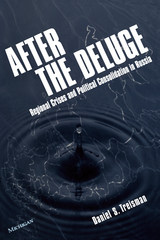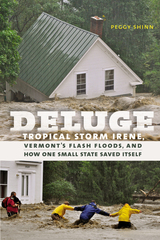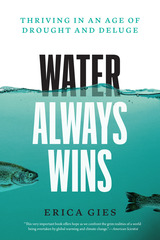3 books about Deluge

After the Deluge
Regional Crises and Political Consolidation in Russia
Daniel S. Treisman
University of Michigan Press, 2001
After the Deluge offers a new, provocative interpretation of Russia's struggle in the 1990s to construct a democratic system of government in the largest and most geographically divided country in the world. The Russian Federation that emerged from the Soviet Union faced dissolution as the leaders of Russia's constituent units in the early 1990s defied Moscow's authority, declared sovereign states on their territory, refused to remit taxes, and even adopted national constitutions, flags, and anthems.
Yet, by mid-decade, a fragile equilibrium had emerged out of the apparently chaotic brinkmanship of central and regional officials. Based on extensive statistical analysis of previously unpublished data as well as interviews with numerous central and regional policymakers, After the Deluge suggests an original and counterintuitive interpretation of this experience.
In most cases, confrontations between regions and Moscow constituted a functional kind of drama. Regional leaders signaled just how much they were willing to risk to secure particular benefits. With a policy of "selective fiscal appeasement," federal officials directed subsidies, tax breaks, and other benefits to the most protest-prone regions, which in turn engendered a shift in local public opinion. By buying off potential regional dissenters, Moscow halted what might have become an accelerating bandwagon.
Besides offering insight into Russia's emerging politics, After the Deluge suggests a range of parallels to other cases of territorially divided states and empires--from contemporary China to Ottoman Turkey. It should appeal to a broad audience of scholars in political science, economics, history, geography, and policy studies.
Daniel S. Treisman is Assistant Professor of Political Science, University of California, Los Angeles.
Yet, by mid-decade, a fragile equilibrium had emerged out of the apparently chaotic brinkmanship of central and regional officials. Based on extensive statistical analysis of previously unpublished data as well as interviews with numerous central and regional policymakers, After the Deluge suggests an original and counterintuitive interpretation of this experience.
In most cases, confrontations between regions and Moscow constituted a functional kind of drama. Regional leaders signaled just how much they were willing to risk to secure particular benefits. With a policy of "selective fiscal appeasement," federal officials directed subsidies, tax breaks, and other benefits to the most protest-prone regions, which in turn engendered a shift in local public opinion. By buying off potential regional dissenters, Moscow halted what might have become an accelerating bandwagon.
Besides offering insight into Russia's emerging politics, After the Deluge suggests a range of parallels to other cases of territorially divided states and empires--from contemporary China to Ottoman Turkey. It should appeal to a broad audience of scholars in political science, economics, history, geography, and policy studies.
Daniel S. Treisman is Assistant Professor of Political Science, University of California, Los Angeles.
[more]

Deluge
Tropical Storm Irene, Vermont’s Flash Floods, and How One Small State Saved Itself
Peggy Shinn
University Press of New England, 2013
On August 28, 2011, after pounding the Caribbean and the U.S. Eastern seaboard for more than a week, Hurricane Irene finally made landfall in New Jersey. As the storm headed into New England, it was quickly downgraded to a tropical storm. And by Sunday afternoon, national news outlets were giving postmortems on the damage. Except for some flooding in low-lying areas, New York City—Irene’s biggest target—had escaped its worst-case scenario. Story over. But the story wasn’t over. As Irene’s eye drifted north, its bands of heavy rains twisted westward over Vermont’s Green Mountains. The mountains forced these bands upward, wringing the rain out of them like water from a sponge. Streams and rivers were transformed into torrents of brown water and debris, gouging mountainsides, reshaping valleys, washing out roads, pulling apart bridges, and carrying away homes, livestock, and automobiles. For weeks, mountain towns were isolated, with no way in or out, and thousands of people were left homeless. In the immediate aftermath of the disaster, it fell on the shoulders of ordinary Vermonters to help victims and rebuild the state. Deluge is the complete story of the floods, the rescue, and the recovery, as seen through the eyes of the people who lived through them: Wilmington’s Lisa Sullivan, whose bookstore was flooded, and town clerk Susie Haughwout, who saved the town records; Tracy Payne, who lost her home in Jamaica—everything in it, and the land on which it sat; Geo Honigford in South Royalton, who lost his crops, but put his own mess on hold to help others in the town; the men who put U.S. Route 4 back together at breakneck speed; and the entire village of Pittsfield, completely isolated after the storm, and its inspirational story of real community.
[more]

Water Always Wins
Thriving in an Age of Drought and Deluge
Erica Gies
University of Chicago Press, 2022
Winner of the Rachel Carson Award for Excellence in Environmental Journalism, Water Always Wins is a hopeful journey around the world and across time, illuminating better ways to live with water.
Nearly every human endeavor on the planet was conceived and constructed with a relatively stable climate in mind. But as new climate disasters remind us every day, our world is not stable—and it is changing in ways that expose the deep dysfunction of our relationship with water. Increasingly severe and frequent floods and droughts inevitably spur calls for higher levees, bigger drains, and longer aqueducts. But as we grapple with extreme weather, a hard truth is emerging: our development, including concrete infrastructure designed to control water, is actually exacerbating our problems. Because sooner or later, water always wins.
In this quietly radical book, science journalist Erica Gies introduces us to innovators in what she calls the Slow Water movement who start by asking a revolutionary question: What does water want? Using close observation, historical research, and cutting-edge science, these experts in hydrology, restoration ecology, engineering, and urban planning are already transforming our relationship with water.
Modern civilizations tend to speed water away, erasing its slow phases on the land. Gies reminds us that water’s true nature is to flex with the rhythms of the earth: the slow phases absorb floods, store water for droughts, and feed natural systems. Figuring out what water wants—and accommodating its desires within our human landscapes—is now a crucial survival strategy. By putting these new approaches to the test, innovators in the Slow Water movement are reshaping the future.
Nearly every human endeavor on the planet was conceived and constructed with a relatively stable climate in mind. But as new climate disasters remind us every day, our world is not stable—and it is changing in ways that expose the deep dysfunction of our relationship with water. Increasingly severe and frequent floods and droughts inevitably spur calls for higher levees, bigger drains, and longer aqueducts. But as we grapple with extreme weather, a hard truth is emerging: our development, including concrete infrastructure designed to control water, is actually exacerbating our problems. Because sooner or later, water always wins.
In this quietly radical book, science journalist Erica Gies introduces us to innovators in what she calls the Slow Water movement who start by asking a revolutionary question: What does water want? Using close observation, historical research, and cutting-edge science, these experts in hydrology, restoration ecology, engineering, and urban planning are already transforming our relationship with water.
Modern civilizations tend to speed water away, erasing its slow phases on the land. Gies reminds us that water’s true nature is to flex with the rhythms of the earth: the slow phases absorb floods, store water for droughts, and feed natural systems. Figuring out what water wants—and accommodating its desires within our human landscapes—is now a crucial survival strategy. By putting these new approaches to the test, innovators in the Slow Water movement are reshaping the future.
[more]
READERS
Browse our collection.
PUBLISHERS
See BiblioVault's publisher services.
STUDENT SERVICES
Files for college accessibility offices.
UChicago Accessibility Resources
home | accessibility | search | about | contact us
BiblioVault ® 2001 - 2024
The University of Chicago Press









